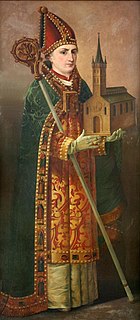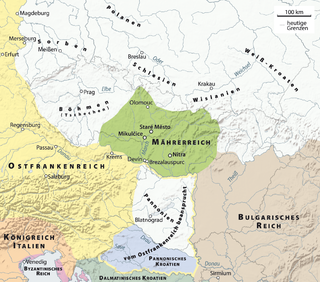 W
WAnsgar, also known as Anskar, Saint Ansgar, Saint Anschar or Oscar, was Archbishop of Hamburg-Bremen in the northern part of the Kingdom of the East Franks. Ansgar became known as the "Apostle of the North" because of his travels and the See of Hamburg received the missionary mandate to bring Christianity to Northern Europe.
 W
WBorna was the Duke of Croatia from c. 810 to 821 and vassal of the Frankish Empire. He resided in Nin and was the ruler of most of the Croats in northern Dalmatia.
 W
WEmma of Altdorf, also known as Hemma, a member of the Elder House of Welf, was Queen consort of East Francia by marriage to King Louis the German, from 843 until her death.
 W
WKocelj was a Slavic ruler of Lower Pannonia, a polity known in historiography as the Balaton principality. He was an East Frankish vassal titled comes (count), and is believed to have ruled between 861 or 864 and 876.
 W
WLiutgard of Saxony was Queen of the Franks from 876 until 882 by her marriage with King Louis the Younger.
 W
WMaurinus of Cologne was a 9th-century German abbot who is said to have died as a martyr. He is recognised as a saint by the Roman-Catholic Church and Eastern Orthodox Church. His 12th-century shrine rests in Saint Pantaleon's Church, Cologne. Saint Maurinus' Church, Lützenkirchen is dedicated to him. His saint's day is 10 June.
 W
WMojmir I, Moimir I or Moymir I was the first known ruler of the Moravian Slavs (820s/830s–846) and eponym of the House of Mojmir. In modern scholarship, the creation of the early medieval state known as Great Moravia is attributed either to his or to his successors' expansionist policy. He was deposed in 846 by Louis the German, king of East Francia.
 W
WOtfrid of Weissenburg was a monk at the abbey of Weissenburg and the author of a gospel harmony in rhyming couplets now called the Evangelienbuch. It is written in the South Rhine Franconian dialect of Old High German. The poem is thought to have been completed between 863 and 871. Otfrid is the first German poet whose name we know from his work.
 W
WRastislav or Rostislav, also known as St. Rastislav, was the second known ruler of Moravia (846–870). Although he started his reign as vassal to Louis the German, king of East Francia, he consolidated his rule to the extent that after 855 he was able to repel a series of Frankish attacks. Upon his initiative two brothers, Cyril and Methodius. sent by the Byzantine Emperor Michael III in 863, translated the most important Christian liturgical books into Slavonic. Rastislav was dethroned by his nephew Svatopluk I of Moravia, who handed him over to the Franks.
 W
WRatimir was a Croatian duke or prince (knez) that ruled the Duchy of Pannonian Croatia between ca. 829 to 838. His name contents the word "rat", meaning "war", and "mir", meaning "peace". It is believed that Ratimir descends from a royal dynasty that provided rulers for Moravia and Croatia.
 W
WSaint Richardis, also known as Richgard, Richardis of Swabia and Richarde de Souabe in French, was the Holy Roman Empress as the wife of Charles the Fat. She was renowned for her piety, and was the first abbess of Andlau. Repudiated by her husband, Richardis later became a Christian model of devotion and just rule. She was canonised in 1049.
 W
WCount Rudolph of Ponthieu was a son of Welf by Hedwig of Bavaria, and thus a brother of Judith of Bavaria, wife of Emperor Louis the Pious. Through Judith’s influence, her brother Rudolph acquired and became Lay Abbot of the Abbeys of Saint Riquier and Jumieges.
 W
WSvatopluk I or Svätopluk I, also known as Svatopluk the Great, was a ruler of Great Moravia, which attained its maximum territorial expansion during his reign.
 W
WSvatopluk II or Svätopluk II was a member of the House of Mojmír and Prince in Moravia from 894 to 899, as which he strove to control all of Great Moravia.
 W
WTrpimir I was a duke in Croatia from around 845 until his death in 864. He is considered the founder of the Trpimirović dynasty that ruled in Croatia, with interruptions, from around 845 until 1091. Although he was formally vassal of the Frankish Emperor Lothair I, Trpimir used Frankish-Byzantine conflicts to rule on his own.